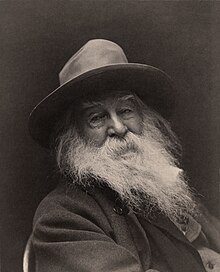
"Song of Myself" is a poem by Walt Whitman (1819–1892) that is included in his work Leaves of Grass. It has been credited as "representing the core of Whitman's poetic vision."

John Crowe Ransom was an American educator, scholar, literary critic, poet, essayist and editor. He is considered to be a founder of the New Criticism school of literary criticism. As a faculty member at Kenyon College, he was the first editor of the widely regarded Kenyon Review. Highly respected as a teacher and mentor to a generation of accomplished students, he also was a prize-winning poet and essayist. He was nominated for the 1973 Nobel Prize in Literature.
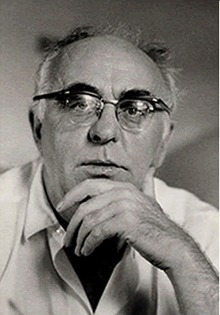
Charles Olson was a second generation modernist American poet who was a link between earlier modernist figures such as Ezra Pound and William Carlos Williams and the third generation modernist New American poets. The latter includes the New York School, the Black Mountain School, and some of the artists and poets associated with the Beat generation and the San Francisco Renaissance.
New Criticism was a formalist movement in literary theory that dominated American literary criticism in the middle decades of the 20th century. It emphasized close reading, particularly of poetry, to discover how a work of literature functioned as a self-contained, self-referential aesthetic object. The movement derived its name from John Crowe Ransom's 1941 book The New Criticism.
William Kurtz Wimsatt Jr. was an American professor of English, literary theorist, and critic. Wimsatt is often associated with the concept of the intentional fallacy, which he developed with Monroe Beardsley in order to question the importance of an author's intentions for the creation of a work of art.

Cleanth Brooks was an American literary critic and professor. He is best known for his contributions to New Criticism in the mid-20th century and for revolutionizing the teaching of poetry in American higher education. His best-known works, The Well Wrought Urn: Studies in the Structure of Poetry (1947) and Modern Poetry and the Tradition (1939), argue for the centrality of ambiguity and paradox as a way of understanding poetry. With his writing, Brooks helped to formulate formalist criticism, emphasizing "the interior life of a poem" and codifying the principles of close reading.
New Formalism is a late 20th- and early 21st-century movement in American poetry that has promoted a return to metrical, rhymed verse and narrative poetry on the grounds that all three are necessary if American poetry is to compete with novels and regain its former popularity among the American people.
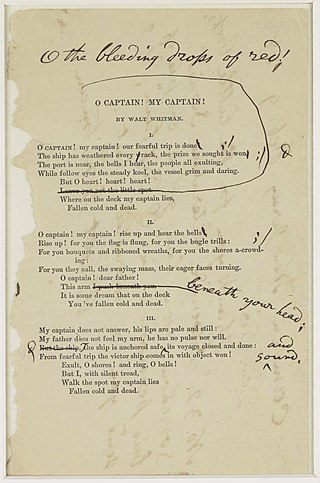
"O Captain! My Captain!" is an extended metaphor poem written by Walt Whitman in 1865 about the death of U.S. president Abraham Lincoln. Well received upon publication, the poem was Whitman's first to be anthologized and the most popular during his lifetime. Together with "When Lilacs Last in the Dooryard Bloom'd", "Hush'd Be the Camps To-Day", and "This Dust Was Once the Man", it is one of four poems written by Whitman about the death of Lincoln.

"When Lilacs Last in the Dooryard Bloom'd" is a long poem written by American poet Walt Whitman (1819–1892) as an elegy to President Abraham Lincoln. It was written in the summer of 1865 during a period of profound national mourning in the aftermath of the president's assassination on 15 April of that year.
Nationality words link to articles with information on the nation's poetry or literature.

Understanding Poetry was an American college textbook and poetry anthology by Cleanth Brooks and Robert Penn Warren, first published in 1938. The book influenced New Criticism and went through its fourth edition in 1976.

The Well Wrought Urn: Studies in the Structure of Poetry is a 1947 collection of essays by Cleanth Brooks. It is considered a seminal text in the New Critical school of literary criticism. The title contains an allusion to the fourth stanza of John Donne's poem, "The Canonization", which is the primary subject of the first chapter of the book.
In literature, the paradox is an anomalous juxtaposition of incongruous ideas for the sake of striking exposition or unexpected insight. It functions as a method of literary composition and analysis that involves examining apparently contradictory statements and drawing conclusions either to reconcile them or to explain their presence.

"Hush'd Be the Camps To-Day" is a poem by Walt Whitman dedicated to Abraham Lincoln. The poem was written on April 19, 1865, shortly after Lincoln's assassination. Whitman greatly admired Lincoln and went on to write additional poetry about him: "O Captain! My Captain!", "When Lilacs Last in the Dooryard Bloom'd", and "This Dust Was Once the Man." "Hush'd" is not particularly well known, and is generally considered to have been hastily written. Some critics highlight the poem as Whitman's first attempt to respond to Lincoln's death and emphasize that it would have drawn comparatively little attention if Whitman had not written his other poems on Lincoln.

David S. Reynolds is an American literary critic, biographer, and historian who has written about American literature and culture. He is the author or editor of fifteen books, on the Civil War era—including figures such as Walt Whitman, Abraham Lincoln, Herman Melville, Nathaniel Hawthorne, Edgar Allan Poe, Ralph Waldo Emerson, Henry David Thoreau, Emily Dickinson, Harriet Beecher Stowe, George Lippard, and John Brown. Reynolds has been awarded the Bancroft Prize, the Lincoln Prize, the Christian Gauss Award, the Ambassador Book Award, the Gustavus Myers Book Award, the John Hope Franklin Prize, and was a finalist for the National Book Critics Circle Award. He is a regular reviewer for The New York Review of Books..
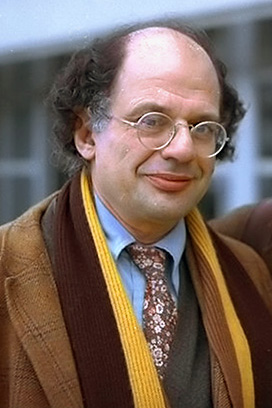
"A Supermarket in California" is a poem by American poet Allen Ginsberg first published in Howl and Other Poems in 1956. In the poem, the narrator visits a supermarket in California and imagines finding Federico García Lorca and Walt Whitman shopping. Whitman, who is also discussed in "Howl", is a character common in Ginsberg's poems, and is often referred to as Ginsberg's poetic model. "A Supermarket in California", written in Berkeley about a market at University Avenue and Grove Street in that city and published in 1956, was intended to be a tribute to Whitman in the centennial year of the first edition of Leaves of Grass.

"This Dust Was Once the Man" is a brief elegy written by Walt Whitman in 1871. It was dedicated to Abraham Lincoln, the 16th president of the United States, whom Whitman greatly admired. The poem was written six years after Lincoln's assassination. Whitman had written three previous poems about Lincoln, all in 1865: "O Captain! My Captain!", "When Lilacs Last in the Dooryard Bloom'd", and "Hush'd Be the Camps To-Day".
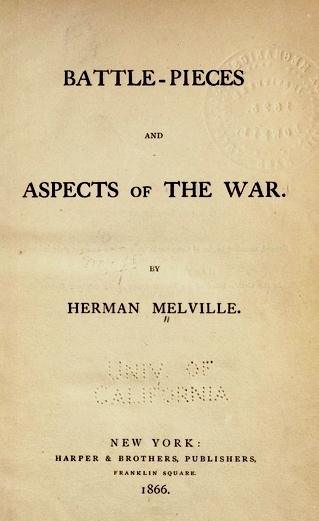
Battle-Pieces and Aspects of the War is the first book of poetry of the American author Herman Melville. Published by Harper & Brothers of New York in 1866, the volume is dedicated "To the Memory of the Three Hundred Thousand Who in the War For the Maintenance of the Union Fell Devotedly Under the Flag of Their Fathers" and its 72 poems deal with the battles and personalities of the American Civil War and their aftermath. Also included are Notes and a Supplement in prose in which Melville sets forth his thoughts on how the Post-war Reconstruction should be carried out.

The American poet Walt Whitman greatly admired Abraham Lincoln, the 16th president of the United States, and was deeply affected by his assassination, writing several poems as elegies and giving a series of lectures on Lincoln. The two never met. Shortly after Lincoln was killed in April 1865, Whitman hastily wrote the first of his Lincoln poems, "Hush'd Be the Camps To-Day". In the following months, he wrote two more: "O Captain! My Captain!" and "When Lilacs Last in the Dooryard Bloom'd". Both appeared in his collection Sequel to Drum-Taps later that year. The poems—particularly "My Captain!"—were well received and popular upon publication and, in the following years, Whitman styled himself as an interpreter of Lincoln. In 1871, his fourth poem on Lincoln, "This Dust Was Once the Man", was published, and the four were grouped together as the "President Lincoln's Burial Hymn" cluster in Passage to India. In 1881, the poems were republished in the "Memories of President Lincoln" cluster of Leaves of Grass.
"Come Up from the Fields Father" is a poem by Walt Whitman. It was first published in the 1865 poetry volume Drum-Taps. The poem centers around a family living on a farm in Ohio who receives a letter informing them that their son has been killed, and chronicles their grief, particularly that of the boy's mother. It was one of his most frequently anthologized poems during his lifetime, and resonated with many Americans who had experienced the death of family members in the Civil War.
